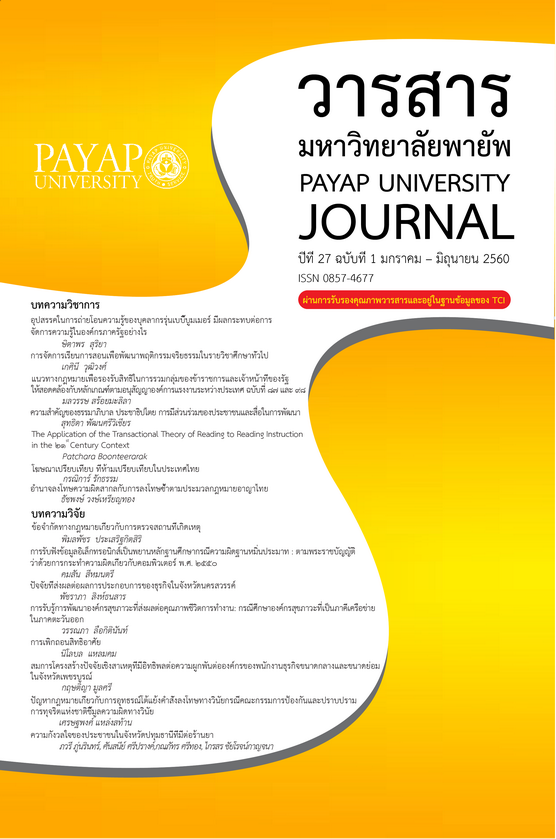THE APPLICATION OF THE TRANSACTIONAL THEORY OF READING TO READING INSTRUCTION IN THE 21ST CENTURY CONTEXT
Main Article Content
บทคัดย่อ
ผู้อ่านภาษาที่สองในศตวรรษที่ 21 ต้องประสบกับข้อมูลและบทอ่านในภาษาที่สองทั้งในรูปแบบ ดิจิทัล และรูปแบบเอกสารเป็นจำนวนมาก ซึ่งลักษณะดังกล่าว ก่อให้เกิดความกังวลว่ารูปแบบที่หลากหลาย ของบทอ่านแบบดิจิทัลและการมีแหล่งข้อมูลดิจิทัลจำนวนมากอาจนำไปสู่พฤติกรรมการอ่านแบบผิวเผินของ ผู้อ่านภาษาที่สองโดยผู้อ่านภาษาที่สองอาจเลือกใช้บทบาทการเป็นผู้อ่านเชิงรับเพื่อค้นหาข้อมูลที่ต้องการจากเรื่องที่อ่านเท่านั้น ผู้อ่านภาษาที่สองอาจละเลยการอ่านเชิงลึกที่ต้องใช้ทักษะการคิดวิเคราะห์ และขาดความสนใจในการอ่านเพื่อสุนทรียภาพ ทฤษฏีการอ่านแบบแทรนแซคเซิ่นนอล ถึงแม้ว่าจะไต้รับการกล่าวถึงครั้งแรกในศตวรรษที่ 20 แต่มีความเหมาะสมกับการเรียนการสอนการอ่านภาษาที่สองในศตวรรษที่ 21 ประการแรก ทฤษฏีดังกล่าวให้ความสำคัญกันบทบาทเชิงรุกของผู้อ่านโดยผู้อ่านเป็นผู้ที่สร้างความหมายให้กับเรื่องที่อ่าน โดยใช้ความรู้ทั้งด้านวัฒนธรรมและสังคมรวมถึงประสบการณ์ของตนเอง ประการที่สอง ทฤษฏีดังกล่าวมุ่งเสริมสร้างทักษะกระบวนการคิดขั้นสูงซึ่งเป็นทักษะที่สำคัญในการอ่านในบริบทของศตวรรษที่ 21
Article Details
เอกสารอ้างอิง
Bloom B. S. (1956). Taxonomy of Educational Objectives, Elandbook I: The Cognitive Domain. New York, NY: David McKay Co Inc.
Casteel, C.P., Isom, B. A., & Jordan, K.F. (2000). Creating confident and competent readers: Transactional strategies instruction. Intervention in school and clinic, 36(2), 67-74.
Coiro, J., & Dobler, E. (2007). Exploring the online reading comprehension strategies used by sixth-grade skilled readers to search for and locate information on the Internet. Reading Research Quarterly, 42(2), 214-257.
Dugan, J. (1997). Transactional literature discussions: Engaging students in the appreciation and understanding of literature. The Reading Teacher, 51(2). 86-96.
Jewitt, c. (2005). Multimodality, “reading”, and “writing” for the 21st century. Discourse: Studies in the cultural politics of education. 26(3), 315-331.
Kingsley, T.L., Cassady, J.C., &Tancock, S.M. (2015). Successfully promoting 21;t century online research skills: Interventions in 5ti -grade classrooms. Reading Horizons, 54(2), 91-134
Liu, z. (2005). Reading behavior in the digital environment: Changes in reading behavior over the past ten years .Journal of Documentation, 61(6), 700-712.
Nathan, R. (2010). Back to the future?: The role of critical thinking and high levels of reading comprehension in the 21;t century. Caifornia English, 16(2), 6-9.
Nicholas, D., & Clark, D. (2012). Reading in the digital environment. Learned Publishing, 25(2), 93¬98.
Nielsen Book. (2011). Nielsen Book releases 2010 book production figures. Retrieved from www.ielsenbookdata.co.uk
Parenti, M. (2013). Driving the reading act: Shifting between the aesthetic and efferent stance when approaching informational text in the common core era. The Caifornia Reader, 46(4). 16-20.
Pennell, C. (2014). เท the age of analytic reading: Understanding readers’ engagement with text. The Reading Teacher, 68(4), 251-260.
Rosenblatt, L. M. (1969). Towards a transactional theory of reading. Journal of Literacy Research, 1(1), 41-47.
Rosenblatt, L.M. (1988). Writing and reading: The transactional theory. Technical Report416, New York University.
Rosenblatt, L. (1990). Retrospective. In E. Farrell & J. Squire (Eds.), Transactions with Literature: A Fifty Year Perspective (pp. 97-107). Urbana, IL: National Council of Teachers of English.
Shabani, A., Kharaji, F.N., & Abedi, M.R. (2012). Reading Behavior of Graduate Students in Digital Environment at University of Isfahan through 2008-2009: A Case study. International Journal of Information Science and Management, 10(1), 1-14.
Wagner, T. (2008). Rigor redefined. Educational Leadership, 66(2), 20-24.
Web-Based Education Commission. (2000). Report of the Web-based Education Commission to the President and the Congress of the United States. 2017, February 8. https://www2.ed.gov/offices/ACAA/BEC/FinalReportAA/BECReport.pdf
Wichadee, s. (2014). Developing reading and summary writing abilities of EFL undergraduate students through transactional strategies. Research in Education, 92, 59-71


